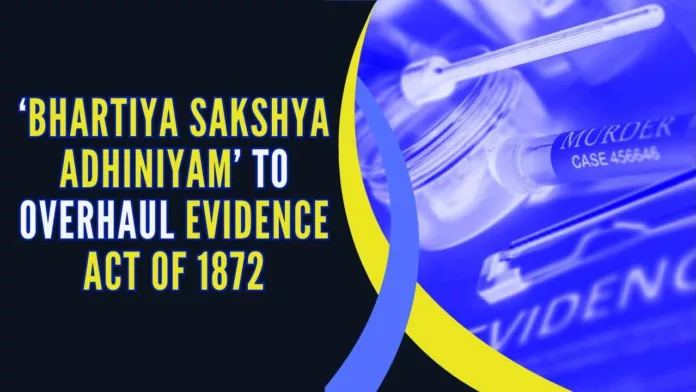
Bhartiya Sakshya Adhiniyam: Bills to revamp criminal laws moved with electric speed
In a bid to modernize the legal framework and adapt to the evolving landscape of technology and society, the Central government has unveiled a groundbreaking legislation named the “Bhartiya Sakshya Adhiniyam“.
This proposed bill seeks to amend and revamp the existing ‘Evidence Act of 1872’, which has remained largely unchanged for over a century.
The Evidence Act of 1872 was enacted with the purpose of consolidating the laws related to evidence, thereby aiding courts in reaching informed conclusions and delivering just judgments.
However, as the Indian democracy has matured over the course of seven decades, there is a growing consensus that the legal system must be brought in line with contemporary needs and aspirations.
Unlike substantive or procedural laws, the law of evidence falls within the realm of “adjective law,” defining the processes and methods through which substantive or procedural laws are executed.
As per experts, the existing law, unfortunately, fails to account for the rapid technological advancements that India has witnessed in recent decades.
However, the proposed “Bhartiya Sakshya Adhiniyam” holds several key provisions that aim to bridge this gap between traditional legal norms and modern technological realities.
Electronic evidence
The new legislation explicitly acknowledges that ‘evidence’ encompasses electronically provided information. This novel inclusion allows witnesses, accused individuals, experts, and victims to appear through electronic means, acknowledging the practicality and efficiency of virtual interactions.
Digital records on par with paper records
The bill establishes that electronic or digital records hold the same legal standing as their traditional paper counterparts. This step not only recognizes the prevalence of digital information but also ensures that electronic records are treated with equal validity, enforceability, and legal effect.
Expansion of secondary evidence
The proposed legislation broadens the scope of secondary evidence to include copies made using mechanical processes, copies compared with originals, counterparts of documents, and even oral accounts of document contents provided by individuals who have personally witnessed them. Additionally, a mechanism for verifying the authenticity of electronic records through matching hash values is introduced, adding a layer of assurance to secondary evidence.
Regulation of admissible facts
The bill aims to establish well-defined limits on the admissibility of facts in court proceedings. Furthermore, it introduces a standardized certification process for the admissibility of facts, fostering consistency in the application of evidence-related rules across different courts.
“With the proposed amendment in BSA bill, 2023, a device in which an electronic record on emails, server logs, documents on computers, laptop or smartphone, messages, websites, locational evidence, and voice mail messages are stored is considered under the definition of documents which will remove the complexities of using electronic/ digital records and it will be considered as primary evidence having similar enforceability like paper documents,” said Siddharth Malkania, a Delhi based criminal lawyer.
“This bill repeals five old provisions, amends 23 existing provisions, and introduces a new provision, leading to a total of 170 sections in the revised Act. These changes hold great importance in ensuring a fair justice delivery system, aligning with the goal of equitable justice through legal modifications,” said Supreme Court lawyer Vineet Jindal.
[With Inputs from IANS]
PGurus is now on Telegram. Click here to join our channel and stay updated with all the latest news and views
For all the latest updates, download PGurus App.
- Delhi Police bust fake Indian spice manufacturing unit; seize 15 tonnes of adulterated masalas - May 6, 2024
- Several eateries under fire after Telangana Food Safety officials find expired products - May 6, 2024
- Leading Vice Chancellors, academicians slam Rahul Gandhi; seek action for ‘resorting to falsehood’ - May 6, 2024










